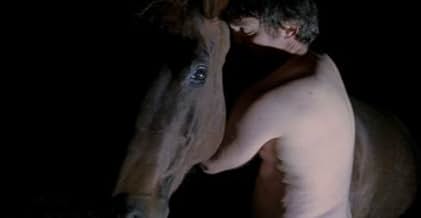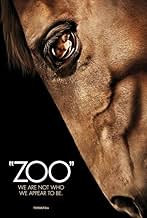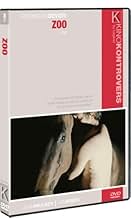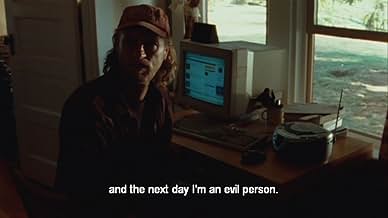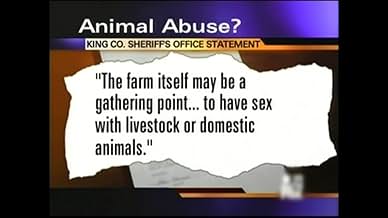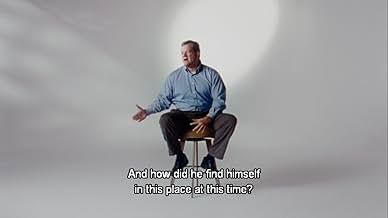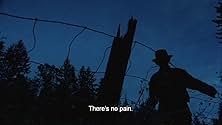IMDb रेटिंग
5.5/10
3.1 हज़ार
आपकी रेटिंग
अपनी भाषा में प्लॉट जोड़ेंA look at the life of an Enumclaw, Washington man who died as a result of an unusual encounter with a horse.A look at the life of an Enumclaw, Washington man who died as a result of an unusual encounter with a horse.A look at the life of an Enumclaw, Washington man who died as a result of an unusual encounter with a horse.
- पुरस्कार
- 1 जीत और कुल 5 नामांकन
Forest Fousel
- Capitol Hill Man
- (as Forest L. Fousel)
Andrew Scott McIntyre
- Military Man
- (as Andrew McIntyre)
Michael J. Minard
- Cop #1
- (as Michael Minard)
फ़ीचर्ड समीक्षाएं
Please don't let the graphic title of this user-comment mislead you (I just couldn't resist writing this), as "Zoo" is in fact - everything but an exploitative and perverted excuse to finally revolve a movie on the controversial topic of bestiality. As strange as it may sound, this documentary/drama is actually very sober, tasteful and not the least bit disrespectful towards people with peculiar (to put it mildly) sexual likings. Robinson Devor, the young and clearly promising young writer/director of "Zoo", based himself on real events as they occurred in Seattle in 2005. A middle aged and divorced man died there as a result of internal bleedings after and here comes the kicker experiencing sexual intercourse with a horse. The media promptly jumped onto this story and in practically no time the authorities unraveled a small but nevertheless fanatic network of people who regularly gathered for a weekend of beer, pizza and
animal sex. The "shocking" news spawned a giant debate and even some riots because apparently there weren't any laws against bestiality in the state of Washington at the time and all sorts of animal rights organizations launched hate-campaigns. Rather than to bluntly categorize the Zoos (short term for Zoophiles) as sick & twisted individuals as well, Devor's film digs a lot deeper into their pasts and personalities. The documentary primarily depicts these Zoos as confused and introverted people with a devoted affection for animals. Of course this doesn't justify their sexual preferences, but at least you don't simply label them as a bunch of perverted freaks. In the hands of any other random exploitation-filmmaker, "Zoo" probably would have existed of nothing more than images of slavering rednecks cheering and queuing to bend over in front of a horse. There isn't a single explicit shot to be found in "Zoo" and the story hardly even hints at sleaze or schlock. If anything, you almost feel like Robinson Devor is to blame for patronizing & protecting these Zoophiles too much, but then still you don't as they already suffered more than enough scandal in various other media. The narrative and filming style of "Zoo" is also quite original and refreshing. The on screen characters are, with the exception of some supportive ones, hired actors but the guiding voice-overs come from actual interviews with the real Zoos. The bitterness and noticeable martyr-tone in their voices gives a whole unique dimension of realism to the film. The photography is truly enchanting and the sober music, oh my God the music, literally sent cold shivers down my spine. Regardless of the questionable subject matter, "Zoo" is a dreamy & highly elegant film that comes with my highest possible recommendation.
Aside from the cinematography, which is outstanding, this documentary is not worth watching. The subject obsession is incomprehensible, if not reprehensible. While I can certainly feel compassion for the man's family, I can only shake my head at what he subjected himself to, time and time again. What can a man be thinking to allow a half ton animal to mount him and shove its two foot long penis into him?? For those of you who are tempted to download and watch the actual footage of the featured encounter (which is flashed briefly a few times in the film itself) my advice to you is don't. I have to admit that I allowed my curiosity to get away with me. Now I wish I could unwatch it.
Zoo is probably as tasteful a movie as can be, given its bestial subject. For those of you who aren't aware, there's a small population of the world who prefer the love of an animal--both mentally and physically--over the love of a human. This film stylistically recreates the life and death of one horse lover, Mr. Hands, and his pack of animal molesting friends, during one of many meetings and BBQ's in a small town near Seattle. Mr. Hands died from internal injuries, caused by the numerous and repetitive thrusting of the enlarged member of a stallion into his anus.
The film is tasteful because it's not sleazy. In this respect, it's almost worse on the audience because it humanizes these so-called animal lovers. What you'd think would be more like a shockumentary, more than anything else, really becomes a shallow dissection of a zoophile's playful mind. It's certainly not psychological, nor really in-depth; but its shallowness really makes it that much more grim.
As I watched the film, I felt like a voyeur peering into the lives of ordinary human beings doing absolutely bizarre and reprehensible things--and they just talked about it as if it were as benign and workaday as eating a bowl of cereal or taking the dog for a ride (insert pun here). Yet, much like a pedophile talking about his love for children, these zoophile's innocently and sincerely spoke about their love for animals.
Initially concerned about the content of the film, I left the theater without witnessing the exploitation or mockery of bestiality, nor did I see anything graphic or overtly sexual. I did leave the theater a little sickened, however, because I didn't loathe Mr. Hands or his friends. In fact, I somehow sympathized with their pitiful plight.
The film is tasteful because it's not sleazy. In this respect, it's almost worse on the audience because it humanizes these so-called animal lovers. What you'd think would be more like a shockumentary, more than anything else, really becomes a shallow dissection of a zoophile's playful mind. It's certainly not psychological, nor really in-depth; but its shallowness really makes it that much more grim.
As I watched the film, I felt like a voyeur peering into the lives of ordinary human beings doing absolutely bizarre and reprehensible things--and they just talked about it as if it were as benign and workaday as eating a bowl of cereal or taking the dog for a ride (insert pun here). Yet, much like a pedophile talking about his love for children, these zoophile's innocently and sincerely spoke about their love for animals.
Initially concerned about the content of the film, I left the theater without witnessing the exploitation or mockery of bestiality, nor did I see anything graphic or overtly sexual. I did leave the theater a little sickened, however, because I didn't loathe Mr. Hands or his friends. In fact, I somehow sympathized with their pitiful plight.
Zoo is not a docudrama about caging animals but about having sex with them. The film, directed by Robinson Devor, comes out of an incident in 2005 in Enumclaw Washington, a rural community 45 miles southeast of Seattle in which a Boeing engineer died as a result of a perforated colon after having anal intercourse with an Arabian stallion. Known only as Mr. Hands in the film, the deceased man was a divorced father of a young son with a top level job who used his weekends as an escape from a suffocating life style. Since Washington law at the time allowed sex with animals, no one was charged with a crime.
While few object to depriving animals of their freedom in zoos or sending them to slaughterhouses to be ground up for hamburgers, the thought of men having sex with animals stirs up reservoirs of righteous indignation and the incident became fodder for the media and Internet message boards which approached it with typical scorn and ridicule. Devor uses a combination of audio interviews with actual participants and reenactments from actor stand-ins to attempt to shed some light on what actually happened. The film delivers neither judgment of the practice nor evaluation of the psychology behind it but simply raises the question whether zoophilia is simply another form of sexual orientation or whether it constitutes abuse of a being incapable of giving consent.
Shot in muted colors, Zoo has a lyrical and poetic style with a moving sound track that gives the film an air of something forbidden but also something eerily beautiful. Bringing a taboo subject out of the darkness and subjecting it to some light, the film allows us to reexamine our preconceived notions about a practice that has in fact been going on since Ancient Greece. Opening with an interview with Coyote, a coal miner from Virginia who came to Washington to meet like minded friends, the film examines the phenomenon of the "zoophile" community, a group of isolated individuals where such appetites are shared. The men gather at all night parties, talk about their love for animals, and engage in an activity they consider natural but which the rest of the world frowns upon. After he was identified as a participant, one man asks how he could be a good man yesterday and a bad man today but the question remains unanswered.
We hear the voices of some of the members of the group but only Jenny Edwards of the organization "Hope for Horses" speaks directly to the camera. While the thrust of her remarks are humane, her participation in a dramatization of the gelding of the horse involved is disturbing and is certainly done without the horses consent. Zoo neither endorses sex with animals nor condemns it but simply empathizes with the humanity of the participants who, for one reason or another, prefer anonymous sex as Richard Gere put it in Pretty Woman, "without all the emotional hassles" of relationships. By doing so, the issue is removed from the level of abstraction and the death is made heartbreakingly real.
While few object to depriving animals of their freedom in zoos or sending them to slaughterhouses to be ground up for hamburgers, the thought of men having sex with animals stirs up reservoirs of righteous indignation and the incident became fodder for the media and Internet message boards which approached it with typical scorn and ridicule. Devor uses a combination of audio interviews with actual participants and reenactments from actor stand-ins to attempt to shed some light on what actually happened. The film delivers neither judgment of the practice nor evaluation of the psychology behind it but simply raises the question whether zoophilia is simply another form of sexual orientation or whether it constitutes abuse of a being incapable of giving consent.
Shot in muted colors, Zoo has a lyrical and poetic style with a moving sound track that gives the film an air of something forbidden but also something eerily beautiful. Bringing a taboo subject out of the darkness and subjecting it to some light, the film allows us to reexamine our preconceived notions about a practice that has in fact been going on since Ancient Greece. Opening with an interview with Coyote, a coal miner from Virginia who came to Washington to meet like minded friends, the film examines the phenomenon of the "zoophile" community, a group of isolated individuals where such appetites are shared. The men gather at all night parties, talk about their love for animals, and engage in an activity they consider natural but which the rest of the world frowns upon. After he was identified as a participant, one man asks how he could be a good man yesterday and a bad man today but the question remains unanswered.
We hear the voices of some of the members of the group but only Jenny Edwards of the organization "Hope for Horses" speaks directly to the camera. While the thrust of her remarks are humane, her participation in a dramatization of the gelding of the horse involved is disturbing and is certainly done without the horses consent. Zoo neither endorses sex with animals nor condemns it but simply empathizes with the humanity of the participants who, for one reason or another, prefer anonymous sex as Richard Gere put it in Pretty Woman, "without all the emotional hassles" of relationships. By doing so, the issue is removed from the level of abstraction and the death is made heartbreakingly real.
I appreciate that the filmmaker is going for more than shock, but I'm not sure what this film really has to offer. It's clear that the filmmaker has some sympathy for the zoophiles, but as a whole, the film is mess. It's beautifully filmed. Almost every frame is mesmerizing, but it feels distracting rather than enlightening. The impeccably filmed images work to mask a lack of insight. Not a terrible film, but the novelty of the subject matter will bring it more attention than it ultimately deserves. It's also derivative. It borrows heavily from Errol Morris. It's probably better than most stuff out there now. At least I saw it instead of Georgia Rule.
क्या आपको पता है
- ट्रिवियाThe horse performer in this movie was a Thoroughbred mare named 'Somebodys Baby', and is a former successful racehorse. The horse in the incident portrayed was in reality an Arabian stallion.
- कनेक्शनFeatured in Aristokraticheskiy kinematograf: एपिसोड #1.9 (2011)
टॉप पसंद
रेटिंग देने के लिए साइन-इन करें और वैयक्तिकृत सुझावों के लिए वॉचलिस्ट करें
- How long is Zoo?Alexa द्वारा संचालित
विवरण
बॉक्स ऑफ़िस
- US और कनाडा में सकल
- $69,770
- US और कनाडा में पहले सप्ताह में कुल कमाई
- $7,811
- 29 अप्रैल 2007
- दुनिया भर में सकल
- $69,770
- चलने की अवधि
- 1 घं 15 मि(75 min)
- रंग
- पक्ष अनुपात
- 1.78 : 1
इस पेज में योगदान दें
किसी बदलाव का सुझाव दें या अनुपलब्ध कॉन्टेंट जोड़ें


